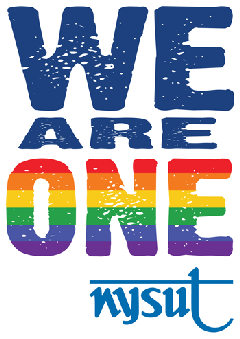 Individuals who identify as LGBTQ can face significant barriers to health care, often due to distrust, fear, access or past negative health care experiences. LGBTQ patients as a demographic are also at a higher risk for delaying medical care and not being open with medical professionals about their identities and/or behaviors.
Individuals who identify as LGBTQ can face significant barriers to health care, often due to distrust, fear, access or past negative health care experiences. LGBTQ patients as a demographic are also at a higher risk for delaying medical care and not being open with medical professionals about their identities and/or behaviors.
NYSUT school and hospital health care professionals are seeking education to help change that.
"The first, and biggest, thing that needs to be done is education," said Rowan Collins, an educator with the Gay Alliance who provides training to colleges, schools and companies.
"This ranges from health professionals educating themselves about issues related to the LGBTQ community, as well as keeping up to date with the current climate, to including LGBTQ health issues in curriculum."
Health care professionals also need information on how to best care for a patient or student who is transgender, pansexual, lesbian or any other identity, Collins said.
"Union leaders can help in this effort by making sure their members know their rights and responsibilities," Collins said.
Health care teachers, school social workers and school nurses, for example, may not know their union or administration will have their back if they advocate for LGBTQ students or patients, he explained. "Even if a policy exists that is inclusive, be sure that it is explicitly talked about and made aware to all union members."
In most situations, it really all begins with conversation.
"Asking people if they feel comfortable sharing how they identify so you can respectfully refer to them is such an easy fix. It means the world to people in the LGBTQ community, especially questions about pronouns and names. In a private one-on-one conversation, this can assuage a lot of fears and anxieties both for the provider and for the patient/client/student, etc.," Collins said.
School settings are not always comfortable zones to talk about identity. "It can be incredibly terrifying for an LGBTQ person, especially a school-aged individual, to approach a medical professional for help in which they might have to ‘come out' or disclose their identity," Collins pointed out.
In a medical office or hospital, people seeking care can feel very awkward or be treated dismissively if they have a birth name that no longer matches their identity. Yet they may not have the financial means to legally change their name or have surgery.
"Feeling isolated from proper medical care and attention — both physical and mental — can be incredibly detrimental to anyone, but especially to LGBTQ individuals who are feeling further repressed, ignored and unseen," Collins said.
Collins presented on disparities in the LGBTQ community at a recent NYSUT Health Care Professional Issues Forum. Members working in the field expressed concern about how health care forms are limiting.
"Forms are a huge issue for lots of LGBTQ individuals because they are so often exclusionary and can set a poor tone for the entire medical experience," Collins said.
"If you do not see ... your identity reflected in the forms you fill out every single time you visit a medical provider, it can be very dehumanizing and exhausting."
The Gay Alliance also educates staff at hospitals, clinics, government organizations, libraries and businesses. The alliance provides about a dozen school training workshops each month to staff and students, Collins said. Training requests used to be more reactive — usually called for after an incident — but now they are more proactive, particularly since the State Education Department released the Transgender and Gender Nonconforming Guidance Document (www.nysed.gov/Press/Transgender-and-Gender-Nonconforming-Students-Guidance-Document) last year with the goal of sending it to every public school district in the state.
NYSUT's LGBTQ Committee is searching for ways to provide resources for both transgender members and for members who are health care professionals, said James Larson, a NYSUT legislative staffer who works with the committee.
"We need to identify who within the medical community will stand up for LGBTQ rights and increase access to proper medical care," said NYSUT Vice President Paul Pecorale, who co-chairs the LGBTQ Committee with NYSUT Vice President Catalina Fortino.
Collins outlined important steps health care facilities and professionals can take:
- Make medical forms more inclusive;
- Make waiting rooms more inclusive and welcoming;
- Represent a variety of identities in brochures and reading materials;
- Use inclusive language;
- Be sensitive to the unique needs of clients;
- Demonstrate a willingness to work with or fight insurance companies to obtain coverage; and
- Be honest when you don't know something.
For more info
Since January 2016, the Gay Alliance has provided 53 school trainings at the request of administrators, teachers, health care professionals or club advisors. The alliance has an extensive resource database at www.gayalliance.org.
Contact the alliance by email, info@gayalliance.org; phone, 585-244-8640; or at the LGBTQ Resource Center, at 100 College Ave., Rochester, NY 14607.